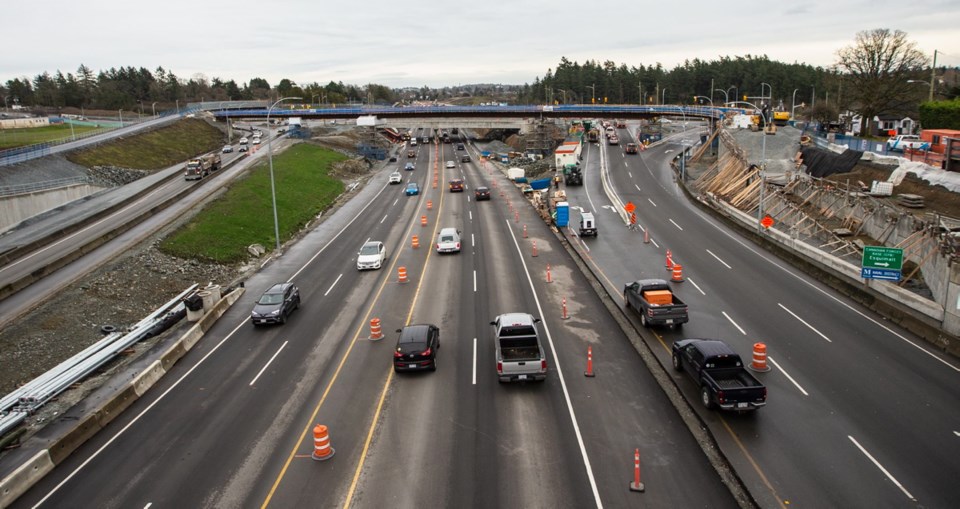Former Times Colonist reporter Norm Gidney used to refer to what he called Victoria’s “imaginary friends.”
They’re the issues we talk about — and talk and talk and talk — without taking action: municipal amalgamation, police amalgamation, the Malahat, the Colwood Crawl … .
Think of Bill Murray in Groundhog Day, awakening to the same clock-radio song, over and over, never moving ahead.
Except it seems 2020 will be the year a couple of those imaginary friends will become real.
First, the McKenzie interchange, originally promised by the Socreds three decades ago, should be complete this summer. (They popped the cork on the biggest bottleneck, the Trans-Canada part of the project, on Dec. 19.)
Summer is also when we should see the last of the visible construction associated with the capital region’s sewage-treatment project, bringing us to the finale of a soap opera that began around the same time as The Edge of Night. The wastewater work is on track to be finished by the federally mandated deadline of Dec. 31, exactly a year from today. (We should probably fly in the governor of Washington for the ceremonial first flush.)
What else will we see in 2020?
• Right off the hop, those who pay for their own health coverage will see the full elimination of Medical Services Plan premiums Jan. 1. The province says that should save individuals up to $900 a year and families up to $1,800.
• If you live in Saanich, Sooke or Colwood (and a couple of other places), Jan. 1 was supposed to be the day a Victoria-style ban on single-use plastic bags kicked in. But those bans got back-burnered in July when a court ruled that Victoria had exceeded its powers, that its plastics bylaw waded into provincial government jurisdiction.
Some municipalities, including Esquimalt, have put their bag-ban processes on hold while awaiting Victoria’s appeal of the court ruling. Saanich took a different route; it is now waiting for Environment Ministry permission to introduce a bag-ban bylaw that would take effect 60 days after the bylaw is passed.
As for the ministry, it says it got 35,000 replies — a huge response — when it asked the public for input. It plans moves that could include bans on several kinds of single-use packaging, expanding producer responsibility for recycling and changes to the bottle-deposit system. “The co-ordinated series of actions will be announced in the new year and will align with efforts of local and regional governments,” it said Monday.
Other players aren’t waiting for the courts and governments to sort themselves out: Sooke’s two grocery stores, Western Foods and Village Foods, got together and decided to drop plastics as of this Wednesday.
• The ferry gods giveth, and the ferry gods taketh away. Having just cut its 1.5 per cent fuel surcharge two weeks ago, B.C. Ferries will increase fares by an average of 2.3 per cent in April 2020.
The corporation points out that there have been no vehicle-fare hikes since April 2017 and no passenger-fare increases since 2016. In fact, fares on minor and northern routes were cut by 15 per cent in 2018.
• You’ll have to wait a couple of months to find out what’s happening to car insurance. After a 2019 that saw A) a 6.83 rate increase in April and B) way too many social-media images of blazing dumpsters, the province wants a clearer picture of the corporation’s finances before deciding what to do with premiums. It told ICBC to delay its rate application, which would usually be made to the B.C. Utilities Commission in mid-December, until February.
• The sales tax on vaping products jumps to 20 per cent from seven on Wednesday. More changes are expected in the spring: health warnings, restrictions on the amount of nicotine in vapour pods, and bans on vape-related ads in bus shelters, parks and other places young people hang out.
• The carbon tax will go up by a cent a litre or so on April 1, but so will climate action tax credits in July, rising to a maximum of $174 annually (that’s up by $19.50) for low-income adults and $51 for children (up $6.50).
• As of May 1, private businesses will have to list beneficial owners — that is, people who directly or indirectly control the business. Right now, the identity of such people is often hidden. The change is part of the fight against money-laundering and tax evasion.
• No rate changes are in the cards for Victoria transit users yet, though some bus riders in Campbell River and Port Alberni will see fares go down April 1.
• This spring will see the completion of the priority bus lane from the Burnside bridges south to Tolmie Avenue, where the bus-and-bike lane downtown ends.
• Spring is also when the province is supposed to unveil its long-awaited transportation plan for the south Island. The big question is whether it will come with funding and a timeline attached, or whether it will become just another of Victoria’s imaginary friends.



